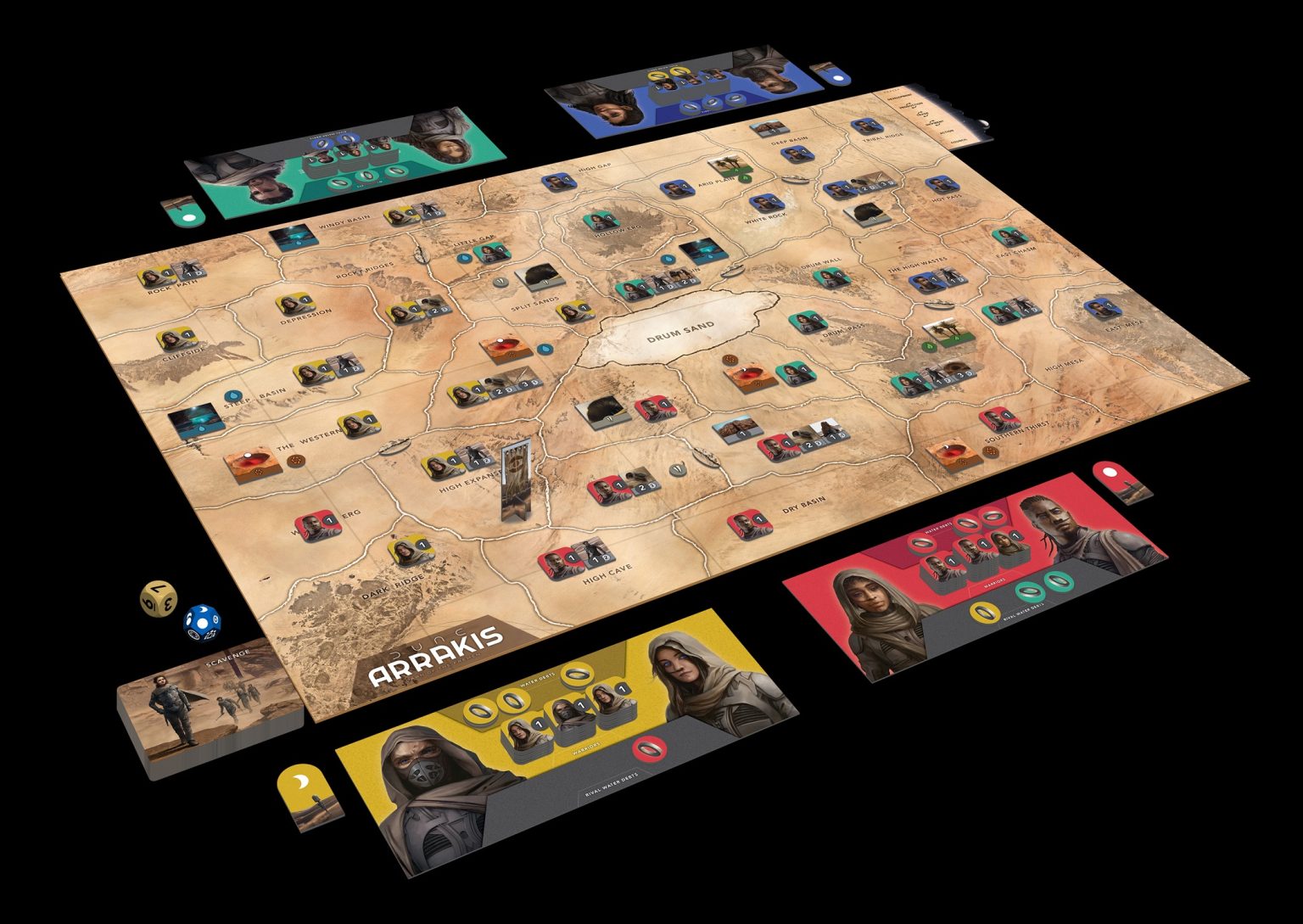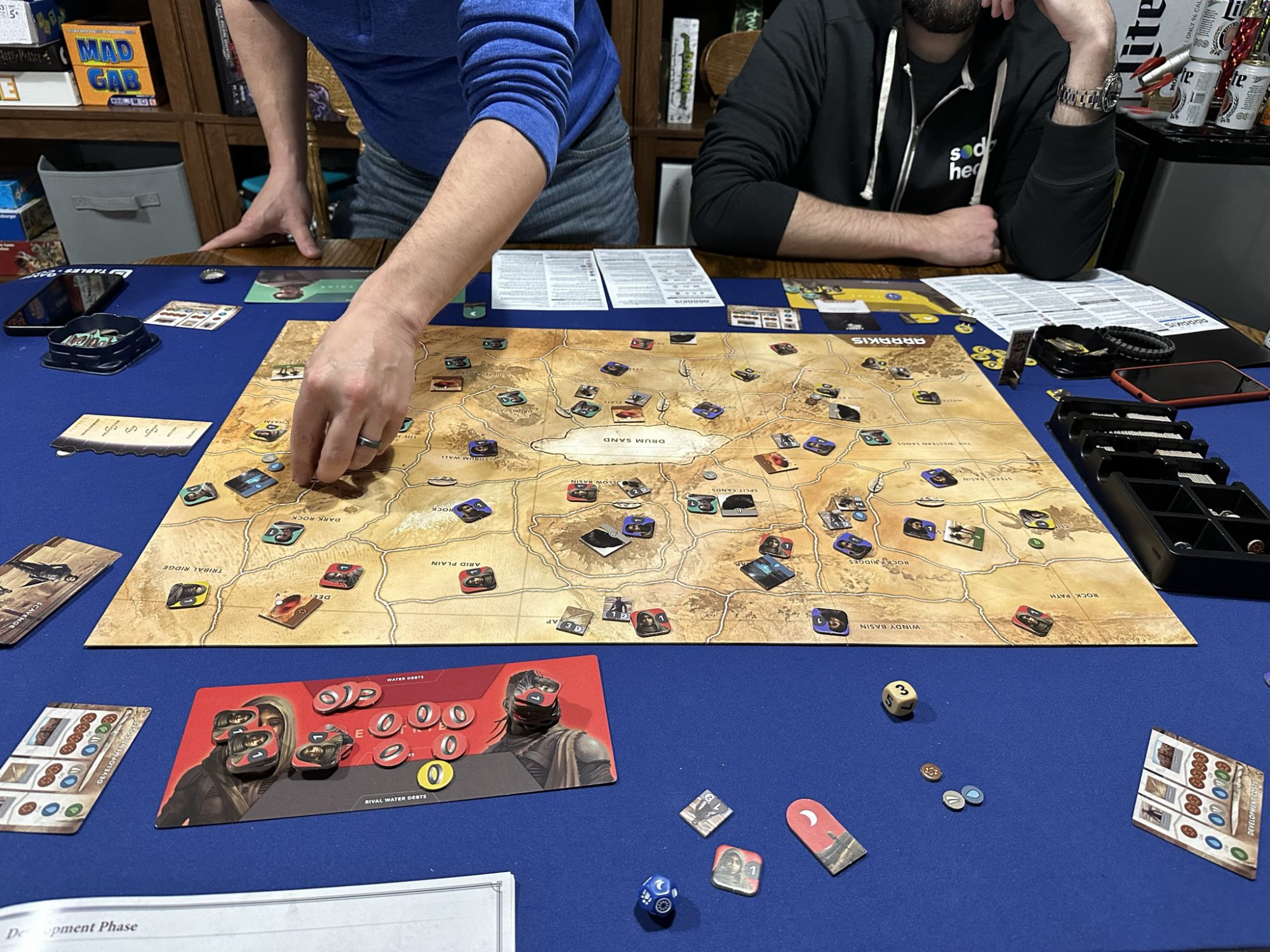Arrakis: Dawn of the Fremen is one of a large pile of Dune board games taking advantage of the hype surrounding Villaneuve’s two-part film epic. In a lot of irrelevent ways it’s just like the rest. Players collect spice, fight over sietches and patches of sand, and even ride worms. In one way, however, it’s unlike any game I’ve ever played let alone other Dune games.
Understanding Arrakis means taking a quick trip down memory lane. This is not a new design; it’s a modern reskinning of an old area control game. It isn’t even the first reskinning. Borderlands—the original design—is a 1982 release by Bill Eberle, Jack Kittredge, and Peter Olotka whose other credits include a couple little games like Dune and Cosmic Encounter.

It’s important to note the age because games were just built differently back then. Older games are easier to break (known as “fragile” in gaming parlance) and demand active intervention by players to keep things in line. Even modern genre classics like Blood Rage and Kemet have various approaches, ways to take control, or even benefits to losing. Arrakis hardly does. Arrakis doesn’t care if you break the game. Hell Arrakis lets you change the rules.
At the end of every round, after you’ve gone through movement and combat and trading and all the stuff of gaming the game makes you pause and discuss changing any rule you want. Don’t like that your warriors don’t move? Let them. Don’t like resource production coming down to a die roll? Screw the roll. Think that someone is running away with the game? Just vote to end it. Anything goes as long as its unanimous.
This unrivaled opportunity for player agency stands in stark contrast to the rigidity of the rest of the game. Arrakis is a game with a firm structure. Combat is an exercise in math, there are no unknown elements like cards or dice. Upgrades like crysknives are purchased and placed out open to all. Opponent’s can intervene but you lose nothing; just take back the attack and go somewhere else. Unless you change the rules.
The economy comes from controlling resource producing spaces, but the set up process ensures that production spaces are evenly distributed. A die roll determines if you produce but it applies to all spaces. Trading is allowed, but the rules say all trades must be 1:1. No sweeteners or bribes. Unless you change the rules.
It’s an extraordinary trust that the designers are placing in the players and something that feels completely out of sync with the modern board game market. The ugly truth is that so many games get purchased and played once or twice before folks move on to the next hot title; Arrakis is not a game built for that world. It is more likely than not that a player group that embraces the voting round is going to screw things up while they find the bounds of the design. It’s also a truth that if you don’t embrace that round you’re going to find yourself playing a game that doesn’t really stand out. This is exemplified by one of my games.

My group loves themselves some negotiation and trading. The very first opportunity we had we immediately voted to open up cajoling and bribes. Water debt, the only concession afforded to a battle loser, has strict rules about how it’s used and acquired and offering it up to discourage aggression or entice a battle ally are not in the rules. So we changed them, and it was great.
Combat gained an edge it didn’t have when we gained the option to change the math with bribes. Movement through an opponent’s territory requires water debt, and the board opened up when it became possible to buy it or entreat a donation from an opponent.
Unfortunately our next rule change did not go so well. Arrakis features formal alliances with hard benefits, like free movement through ally territory, for two players working together. However, all players must agree during voting to formalize the alliance meaning the two players who want to ally have to convince their opponents to let them team up.
The rulebook gives an example of a concession: two players who believe themselves to be in a strong position can offer to let the other two players ally and waive the steeper victory condition. It normally takes controlling three sietches to win; the number rises to 5 for an alliance. The book example suggests offering to let the other alliance stay with 3. So we tried it.
My friend Tim and I felt like we could jump to 5 the very next round faster than our opponent’s could build their third so we made the offer. It almost worked, ultimately our opponent’s cashed in piles of Water Debt to surge for the win. But it wasn’t the ending that fell flat, it was the in between part.
By formalizing two alliances we took a huge part of the tension out of the game. The very bribery we opened up with our first vote went away when there was no one to bribe. The mathy combat got slower, the scheming weaker. The game became as dry as the spice planet itself.
And you know what? That’s fine. I respect a game that gives us the tools to craft our own experience and understand that we have no one to blame for the change but ourselves. It does make it damned hard to recommend Arrakis however. Just because this instance of dual alliances fell flat doesn’t mean that every one will. Just because this time 3 sietches was too few doesn’t mean it always will be. But to find that balance and thread that needle we’ll need to play over and over, trying again and again.
I would love to explore this space, would love to play a game like Arrakis over and over again pushing each game to its limit and maybe just beyond. Unfortunately that’s just not the environment I game in. To be clear the core area control mechanisms of Arrakis are solid; it is a fine game. To make it great, however, I’d need a lot more plays and there’s just too much competition these days.


